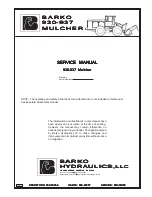
27
MAIN COMPONENTS OF SPRAYER
FLOW BYPASS VALVE
- It bypasses the chemical mixture flow to the nozzles or to the hydraulic agitator.
- After filling the tank and mixing the chemical, engage the PTO on the way from the filling spot to
the area to be sprayed.
- Set the lever of the flow bypass valve to the position "Descarga para o Tanque (agitação)
("Discharge to the Tank (agitation))". In this position, all the mixture will be agitated in the sprayer.
- In starting to spray, set this lever to the position "Comando de Pulverização" (" Spray Control"), in
which the main flow will be directed to the spray boom. The excess on the nozzles will return normally
through the circuit.
spray
control
discharge to the
tank
(agitation)
flow bypass
valve
HYDRAULIC AGITATOR
The agitator operation is the same of most of hydraulic agitators, in which a water flow passes
through throttling that increases its speed, and it, because of the "venturi principle" in the suction
chamber, draws a great deal of water at a speed lower than the entry speed.
The difference in comparison with other agitators is that this one has two inlets. One for high flow
rate (1" hose) and other for low flow rate (1/2" hose). On the low flow rate inlet, that is always in the
same pressure of the nozzles, there is a ceramic tablet that provides the following flow rates for
agitating the mixture:
-At a pressure of 20 psi on the circuit, around 0.79 gpm of chemical mixture pass by the tablet, that
represents due to the venturi system the circulation of 15.85 gpm of chemical mixture in constant
agitation.
- At a pressure of 300 psi on the circuit, around 2.37 gpm of chemical mixture per minute pass by
the tablet, that represents due to the venturi system the circulation of 52.83 gpm of chemical mixutre
in constant agitation.
The two outlets in the system work in different situation:
- The low flow rate inlet allows a continuous agitation in any situation of operation.
- The high flow rate inlet was designed to give a better condition for agitating the chemical mixture
while it is prepared and also on the way from the filling spot to the area to be sprayed.
















































